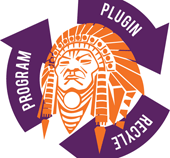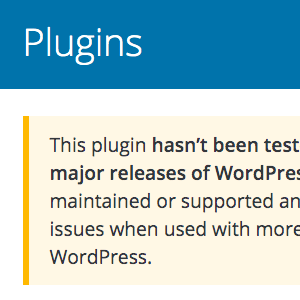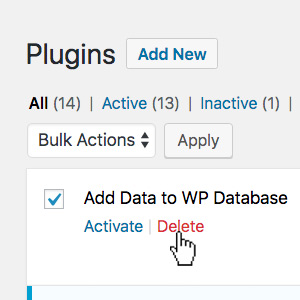Adoption Program for Abandoned Plugins

One of the the most convenient things about WordPress is the abundant 21,834+ free plugins available in the WordPress plugin repository, but how many times do you run into the scary warning at the top of the page, “This plugin hasn’t been updated in over 2 years. It may no longer be maintained or supported and may have compatibility issues when used with more recent versions of WordPress”. If that doesn’t discourage you enough not to download the plugin, maybe putting scary zombies all over the page will do the trick.

Truthfully, the no-update-warning-in-over-2-years isn’t there to indicate that a plugin is abandoned or bad, it’s there to get plugin authors who care about their plugins to actively update them, adjust their readme.txt files, read the support forums, etc. It’s to encourage dev participation, not necessarily to indicate dead plugins. Although, personally I find most plugins with that warning to be abandoned by the author, and sadly there is no way really to know which plugins are truly abandoned, meaning the author is gone forever, never to return.
This we do know, out of the 21,834 plugins in the repository, 7,849 have the no update in over 2 years warning, that is 1 in 3 plugins that are out of date. This is not a healthy sign for such a popular CMS, and the questions being asked shouldn’t be “What can WordPress do for me, its what can I do for the WordPress community”. Authors who contribute free plugins in the repository should be commended for doing so, but if the author can not maintain a plugin that has thousands of users depending on it to be updated and supported, a logical answer is finding a new author, to adopt the plugin.
 WordPress currently makes this a little challenging if you want to adopt a plugin. If you can’t contact the author, you try emailing plugins@wordpress.org but that is no guarantee. So far the only place where abandoned plugins are wanted is the WPrecycle program, where users and authors are encouraged to submit abandoned plugins, in hopes they will be adopted. There are a few rules with the program to make sure the program remains genuine.
WordPress currently makes this a little challenging if you want to adopt a plugin. If you can’t contact the author, you try emailing plugins@wordpress.org but that is no guarantee. So far the only place where abandoned plugins are wanted is the WPrecycle program, where users and authors are encouraged to submit abandoned plugins, in hopes they will be adopted. There are a few rules with the program to make sure the program remains genuine.
- There must be authors consent, and access to the plugin in the repository, so the original plugin is updated, decreasing duplicates in the repository.
- If the plugin is free, it will remain FREE in the repository!
- The author of the original plugin still gets recognition of being the founder of the plugin. (some rebranding maybe done, if the plugin doesn’t have branding at all, name and all will always be the same)
But in order to keep these plugins from going back to being eventually abandoned, and or out of date and not supported, there has to be some sort of incentive for us/developers to invest time in the upkeep of the plugins. The plugins will be free, but depending on the plugin, charging for support, and/or ad ons will be the way to fund the project. By far this is no solution for the high abandonment of plugins, but its a start, its just a matter of time till recycled plugins are announced.
Special guest post by Matt Jones
11 responses
-
This is a really great idea. Also, could we get an Adopt an Abandoned Plugin telethon or concert going, maybe Bob Geldof.
-
Thank you! And that is a fantastic idea haha
-
This really is a good idea. It’s amazing how many WP plugins have that message. Far too many I think.
‘Ask not what WordPress can do for you, ask what you can do for WordPress.’
-
I think an adoption program is a wonderful idea! When I see the warning message on a plugin I always feel like the author has just forgotten about it, and that’s kind of sad.
I am sure there are many developers who would volunteer to take over older plugins. I know of a couple I would love to update and contribute too =D
-
Hi I just bought the e-book digging into wordpress v3.4 and it told me I could login in the future for updates but I haven’t created a login :(
-
Awesome idea :) Hope it can bring old awesome plugins back to life
-
This is a fantastic idea. There are plenty of great plugins that hasn’t been updated and becoming obsolete. I am sure there will be no shortage of developers that want to take over those abandoned plugins.
-
Love the idea…I actually have a list of abandoned plugins I keep wanting to adopt, it just seems my work schedule is still too busy for me to be a proper developer to the poor orphans.
-
My take is that though this is a great idea, there are three larger problems at play here.
1. quality / scope of the idea.
2. quality of the code.
3. type of consumer.
Let me explain:
1. by quality /scope of the idea I mean that there are usually three plugins per idea. i.e. I was recently looking at a plugin for using SMTP to do my mail rather than mail(). There are three or four plugins for this – from a consumers point of view this is really absurd. Why do we need three or four plugins for one simple task? we really don’t. Some code should just be sunset and forgotten about. But this means managing the problem-space and finding reliable solutions for given problems. However, if we look at how plugins come about it is because a developer gets a contract. So rather than augment a plugin for a particular client they just up and create a new one. There are several reasons for this:
A. the implementation task is perceived by the client to be too much or difficult and therefore is contracted out or
B. to achieve the contracted result the developer could spend billable/unbillable time researching the available plugins or they could spend billable time to develop a plugin. At the core of what a plugin in the community of wordpress people it is a feature which is implemented for an end user. This is really different than say a Drupal module which is usually a bit of a frame work which can pull things together to present multiple options to end users. The target audience of a Drupal module is usually a developer, not an end user. So it goes back to how is the community going to respond to managing the problem space? – Look a the resume/hresume/portfolio problem space there are a lot of plugins in that sector, but they all look at solving a particular problem not a presenting users one of a variety of solutions for a single problem space.
2. Quality of the Code, is pretty understandable in that some code is crappy or follows a really different coding/data management style. Dissidence at this level drives developers apart. The WP community could take a stronger stance on the quality of code issue and sunset or force adaption and download through the SVN rather than the
/extendfor code which makes two calls on functions which have been retired from WordPress. This way “old” and therefore “bad” code can be removed from the UX of searching for a plugin which does X.3. Type of consumer, There are really two types of consumers of the WP code those who can code and those who can not. Look at the Forums and the kinds of questions being asked. So who is the target audience of the plugins and themes repo? It feels like it is trying to pander to the consumer-end user and facilitate the conversation with the developer…. and Automattic sits in the middle.
So, I think that in perspective, that this abandonment problem is a by product of how the community of developers approaches the problem space. In a way it is a UX problem because we as developers are not presenting user plugins which serve large enough solutions. – but is it in our financial interest to do so?














